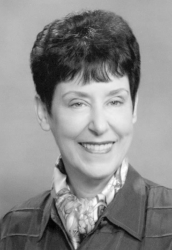Women’s conference speaker will share personal encounter with the Holy Spirit
CHESTNUT HILL -- An intense encounter with the Holy Spirit more than 40 years ago led Patti Gallagher Mansfield to devote her life to encouraging devotion to him who is sometimes referred to as the forgotten member of the Blessed Trinity.
Mansfield, 61, who now serves with her husband as a liaison to the Archbishop of New Orleans in the archdiocese’s Catholic Charismatic Renewal Office, plans to speak at the Boston Catholic Women’s Conference April 18 at Conte Forum at Boston College.
Her topic is “Joyfully Living Through the Power of the Holy Spirit,” a theme of her life since the late 1960s.
As a college undergraduate, she participated in a retreat in February 1967 at Duquesne University in Pittsburgh.
As she recounts in an article about the experience, on a Saturday night during the retreat she went into an upstairs chapel to invite anyone who might be there to a birthday party downstairs.
“Yet, when I entered and knelt in the presence of Jesus in the Blessed Sacrament, I literally trembled with a sense of awe before his majesty. I knew in an overwhelming way that he is the King of Kings, the Lord of Lords. I thought, ‘You had better get out of here quick before something happens to you.’ But overriding my fear was a much greater desire to surrender myself unconditionally to God,” she writes.
“I prayed, ‘Father, I give my life to you. Whatever you ask of me, I accept. And if it means suffering, I accept that too. Just teach me to follow Jesus and to love as he loves.’ In the next moment, I found myself prostrate, flat on my face, and flooded with an experience of the merciful love of God....”
Other participants in the retreat reported similar experiences, and what became known as the Duquesne Weekend started a Catholic charismatic renewal movement in the United States.
Christianity is supposed to lead its followers to a personal relationship with God, but Mansfield argues that for many Catholics religion often presents itself more as knowledge of facts about God.
“For many Catholics who have even been through 12 years of Catholic school there is a knowledge of the faith that’s not always connected to an experience of the Persons of the Blessed Trinity -- the Father, the Son, and the Holy Spirit,” she said in an interview and follow-up e-mail message.
That means proclaiming the Word of God isn’t just about trying to connect with non-Christians or non-Catholics, “but reaching Catholics who have been catechized but not evangelized, who still need to make a journey from the head to the heart, from what is theoretical to what is personal ... to experience the living God. The exercise of faith and prayer directed to the Persons of God the Father, God the Son, God the Holy Spirit, that’s what needs to take place in the lives of Catholics.”
Mansfield said the Catholic charismatic movement emphasizes an experience of being baptized in the Holy Spirit, what St. Paul describes in Chapter 5 of his Letter to the Romans as “the love of God poured into our hearts through the Holy Spirit.”
The effect can be profound. Mansfield points to recent readings at Mass concerning St. Peter, who famously denied knowing Jesus three times after Jesus was arrested. But not long after the resurrection, after Peter and John have called down healing on a crippled man at the Beautiful Gate, Peter refuses to kowtow to threats from the leaders of the Sanhedrin that he and John stop preaching in the name of the Nazorean.
“This same man, after the Holy Spirit came upon him, is giving this fantastic sermon, full of boldness,” Mansfield said. “So when Pentecost happens, which is another way of saying when the Holy Spirit comes, in a personal way, there’s this transformation from timidity to boldness.”
Using personal stories of encounters with God is one of Mansfield’s approaches.
She notes and credits a movement within Catholicism toward explaining Church teachings with the use of Scripture and the history of the Church’s teaching authority, known as apologetics. But her approach is more personal than apologetics, which appeals first to the intellect.
“That is effective in many ways, but the simple telling of how Jesus has helped you, healed you, that simple telling of the Gospel in one’s life can be an effective way of bringing the faith to others,” Mansfield said. ”You are the only Bible some people will ever read.”
The Boston Catholic Women’s Conference is Friday, April 18 from 5 to 9:30 p.m. Mansfield said she hopes her listeners will model their lives on Mary Magdalene, who was one of the first to see Jesus after the resurrection and then reported what she had seen to the disciples, who initially had trouble believing what they were hearing.
“My prayer would be that we women, following the example of Mary Magdalene, or in her train, you might say, would encounter the living Jesus and then go forth to proclaim him,” she said.



















